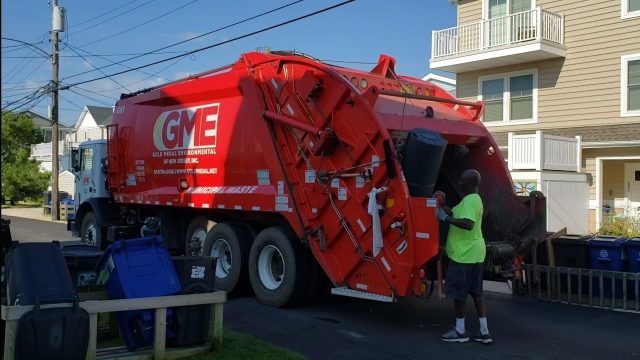
By DONALD WITTKOWSKI
Ocean City’s waste-hauling company has agreed to “fully honor” its trash and recycling contract while negotiations continue to resolve a financial dispute.
Gold Medal Environmental issued a news release April 29 stating that it would cease recycling pickups in Ocean City as of Monday, May 2, because it had been unable to reach an agreement with the city.
However, the company resumed recycling pickups Tuesday while both sides continue negotiations, city spokesman Doug Bergen said in a statement.
“Gold Medal agreed to fully honor its contract for both trash and recycling pickup as of Tuesday. It’s the city’s understanding that Gold Medal will continue to honor its contract while negotiations proceed,” Bergen said.
During Gold Medal’s absence on Monday, Ocean City’s recycling routes were “successfully completed” by trucks and drivers from Sea Isle City. Ocean City pitched in with labor to help the Sea Isle crews, Bergen said.
After the contract dispute became public last week, Ocean City announced plans to provide uninterrupted trash and recycling services through a combination of shared services with Sea Isle, contracted services with vendors outside Gold Medal and by using the Ocean City Public Works Department.
Gold Medal Environmental, or GME, has been under contract to provide trash and recycling pickups for Ocean City for the past four years at about $1.5 million annually. With less than a year remaining on a five-year contract, Gold Medal demanded that Ocean City pay an additional $1.4 million for the balance of 2022, the city said in a statement.
“They offer no detailed explanation of what would justify this increase – beyond generalizations about inflation, labor shortages and changes in recycling markets. Acknowledging these factors, the city agreed to consider adjustments, but asked for data to support the demand,” the statement said.
Gold Medal stated in its April 29 release that “extreme inflationary emergency and pandemic driven labor market shortages have made it broadly impossible to perform labor and fuel intensive services at existing contract levels.”
“GME regrets that it has been unable to successfully engineer with Ocean City any of the multiple solutions adopted by neighboring municipalities to avoid the negative impact on the health, safety and welfare of their residents,” the company said then.
City Business Administrator George Savastano pointed out last week that Ocean City was willing to continue negotiations with GME, but also raised the possibility of filing a lawsuit against the company for breach of contract if an agreement can’t be reached.
Before returning to the job Tuesday, Gold Medal announced it would continue to collect trash in Ocean City but would stop making pickups for recycling and yard waste starting May 2.
During the dispute, Mayor Jay Gillian said in a statement that he would not let a contractor “hold Ocean City’s taxpayers hostage by threatening to withhold services.”
In an email to OCNJDaily.com, Gold Medal CEO Darren Gruendel said his company sought more money from Ocean City to offset its higher expenses for waste-hauling services during the pandemic. He disputed the city’s statement that Gold Medal had “demanded” an extra $1.4 million in contract payments.
“The $1.4M number was the first rate discussed if all services remained unchanged and Ocean City paid generally what other cities have agreed to pay,” Gruendel said in the email.
Ocean City said in its statement that GME employed similar tactics with other municipalities in Cape May County. North Wildwood announced that it had terminated its contract with Gold Medal on April 29.
GME’s news release said the company was able to reach agreements with Avalon, the Wildwoods and Paulsboro “to avoid the kind of service disruptions experienced by other municipalities throughout the pandemic and economic crises.”





